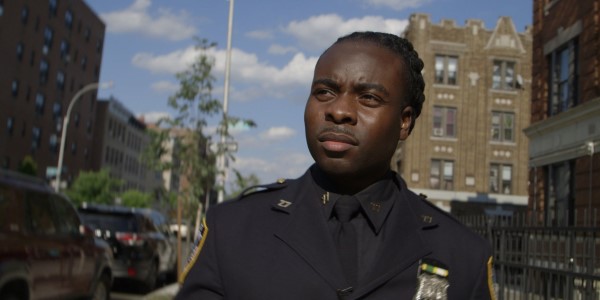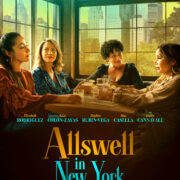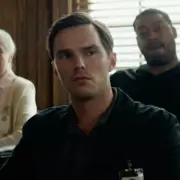CRIME + PUNISHMENT: Urgent Empathy & Action Through Narrative

Tessa is a writer living in Boston, where she spends…
This past month, I had the good fortune of seeing Stephen Maing’s new documentary, Crime + Punishment, at the Boston Independent Film Festival – and, maybe even better, the following Q&A. Maing was in attendance, but it was the handful of individuals featured in the documentary who really captured the audience’s attention.
Perhaps naturally, for a narrative film whose events are still unfolding, the line between film and Q&A quickly began to blur. The room buzzed with iterations of the question “What happened next?”, but that question was impossible to answer. What happened next is still happening, even if it takes a few extra years and another few documentaries before we see it clearly.
Illegal Expectations
Crime + Punishment follows the NYPD12, the group of police officers who joined together in 2015 to file a class-action suit against the New York Police Department, claiming the department illegally required (and may still require) officers to meet a certain monthly quota of summonses and arrests. Officers who don’t meet the expected number can have their careers frozen in place, picked out for not being adequately ambitious.
According to some of the members of the 12, the pressure to meet quotas (which the NYPD firmly denies exist) draws out violently racist policing. An officer, anxious to impress their superior, might go out specifically looking to arrest citizens rather than to deescalate potentially violent situations. With the precedent of more arrests in black and brown communities, this officer may seek out arrestable offenses in these neighborhoods; if they don’t find the crime they’re looking for, they may even falsify claims against the individuals who are most vulnerable to excessive police force.
At the core of this narrative are the whistleblowing officers: some old, some young, some dealing with early parenthood, some still trying to move up in the force. Among the most compelling of these figures is Edwin Raymond, a young black officer who seems to cut through the haze of bureaucratic excuses and see the entire situation clearly.

At the time of the documentary, Raymond is a high-scoring and devoted officer who is praised in private, but continually refused promotion due to his low number of arrests. He maintains that his job is to keep the peace when possible, rather than locking citizens away, but his superiors see this attitude as ineffectual. Idealistic, principled, and unafraid of calling racism by its proper name, Raymond becomes one of our most effective audience conduits – a fact that makes it all the more stressful when his involvement with the NYPD12 paints one more arrow on his back.
Systemic Change and Necessary Compromise
During the Q&A, Raymond stood with a straight back, his hands clasped in front of him, his gaze steady and face neutral. He represented, to my mind, the precise idealized image of an officer of the law. But when asked to elaborate on his motivation to become involved with the police force, he cited his own issues with policing, and his desire to make a positive contribution from within the force.
This statement provides one perspective on an unasked question: if a governmental system has failed so many people so drastically, is it more productive to change this system entirely, or to attempt to shift it internally by promoting the involvement of more culturally conscientious individuals?

It’s a tricky question, made more complex in mind since seeing Crime + Punishment. The documentary doesn’t make systemic change look easy, and sometimes makes it look impossible. In one sequence, Edwin informs Maing that he doesn’t plan to settle with the NYPD for any amount of money. That’s not what the lawsuit is about; he wants change. But even this desire, which seems inherent to criticizing an institutional power, is challenged instantly.
In the immediately following scene, the officers gather around to discuss courtroom strategies, and quickly agree that if they are offered a settlement, they should take it. We are reminded that “trials are about dollars and cents” – if the 12 can hit the NYPD in the wallet, maybe the higher ups will realize that corrupt practices have concrete consequences. Raymond is quiet in this scene, visibly swallowing this not-so-idealistic pill. He is being disillusioned right along with the audience, and the idea of what a happy ending could look like is adjusting for all of us.
This is especially apparent during the taste of a happy ending we can enjoy. Pedro Hernandez, a young man who has been targeted by the NYPD since his early teens, is released from jail and sent back into his mother’s arms. He has served a year rather than a lifetime, and his family rejoice generously, facing the camera to invite Maing into their celebration. A year of false incarceration is horrifying enough, and made all the more harrowing when we remember that this false charge only happened to be the one to stick. Prior to the arrest, Hernandez had already suffered 6 instances of falsified charges made against him.
Crime + Punishment: Continuing Implications
This is a film concerned with racism and corrupt policing in general, but equally, it is concerned with the absolute specifics of the moment and the individuals involved. When I tell my friends to see this movie, it is partially due to the broad issues it raises, and it is also partially because I want Hernandez specifically to be recognized and given a good life. I want the NYPD12 to live comfortably and treated well at work while such a thing is still possible.
Crime + Punishment understands what it is: a documentary that follows the action at its heels with a strong investigative leaning, but which functions foremost as a way to generate urgent empathy.
Considering the care this film affords the individual lives it portrays, we understand it must take effect as rapidly as possible. It’s a documentary to turn viewers into evangelists, filled with fervor and a belief in investing in the current moment: don’t wait, see it now.
Tell us below what other documentaries balance a historical perspective and investment in the present moment?
Find upcoming screenings of Crime + Punishment here.
Does content like this matter to you?
Become a Member and support film journalism. Unlock access to all of Film Inquiry`s great articles. Join a community of like-minded readers who are passionate about cinema - get access to our private members Network, give back to independent filmmakers, and more.
Tessa is a writer living in Boston, where she spends her time eating falafel and falling asleep on public transportation. Her greatest personal goal is to learn how to allow someone to dislike horror films without trying to convince them they just haven't seen the good ones yet.













